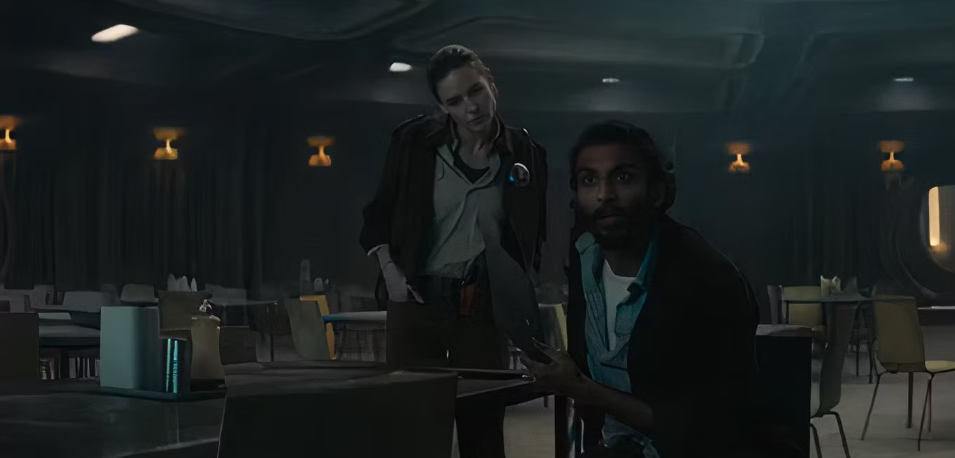Quick Summary
The Flamekeepers in Silo are a secret group of rebels who fought to preserve forbidden knowledge about the world outside the Silo. Nearly 140 years ago, they led a rebellion against the oppressive authorities who sought to control the population by suppressing the truth. Despite their efforts, the Flamekeepers were systematically eradicated, with their memory and history erased by the Silo’s leaders. Juliette, the last surviving Flamekeeper, discovers her connection to this hidden legacy and becomes the key to exposing the Silo’s dark secrets. The story of the Flamekeepers is a powerful commentary on truth, resistance, and the fight against authoritarian control.
Introduction
Silo, the dystopian series streaming on Apple TV+, is an intricate blend of mystery, rebellion, and survival. At the heart of this gripping story lies a forgotten group—the Flamekeepers—whose legacy plays a pivotal role in unraveling the mysteries surrounding the Silo. While the show takes its time to reveal key secrets, the journey is anything but slow. The underlying tension, combined with the constant threat of exposure, keeps viewers on the edge of their seats. Episode 7 deepens this mystery as Juliette uncovers the secrets of the Flamekeepers and their tragic history.
The Flamekeepers were a group of rebels who dared to challenge the authoritarian Silo system, preserving vital pieces of history in their fight for truth and freedom. But what happened to them? Why are they so critical to understanding the Silo’s past and present? Let’s explore their origins, their rebellion, and the brutal suppression that erased their existence from the collective memory of the Silo.




What Are the Flamekeepers in Silo?
The Role of the Flamekeepers in Silo‘s Society
In Silo, the Flamekeepers were a clandestine group of individuals who resisted the oppressive Silo leadership. They are not merely rebels—they are the guardians of forbidden knowledge, fighting to preserve the truth of the outside world and the history the Silo’s authorities worked hard to erase. Their actions were deemed dangerous to the stability of the Silo, which is a highly controlled environment where residents live under strict regulations, especially regarding the concept of the outside world.
The Flamekeepers saw themselves as the last hope for the people of the Silo, striving to awaken them from their ignorance and prevent the manipulation of history. They collected banned documents like the Georgia travel guide, which hinted at a larger world beyond the Silo’s walls. These guides were more than just maps—they were symbols of rebellion, as they contained forbidden truths about the past and the outside world that the Silo authorities desperately wanted to suppress.
The Flamekeepers’ Beliefs and Actions
The core belief of the Flamekeepers was simple: truth is worth fighting for, even at the cost of your life. They were committed to exposing the lies that held the Silo’s inhabitants captive, including the illusion that the Silo was the only place where life could exist. To accomplish this, they kept hidden documents, passed down forbidden knowledge, and even created tools that could help decipher the mysteries of the Silo.
Their actions were deliberate and dangerous. At one point, they managed to smuggle in a forbidden Georgia travel guide, which had the potential to alter the entire understanding of the Silo’s existence. By distributing these guides and speaking of the outside world, the Flamekeepers aimed to disrupt the carefully constructed order within the Silo, challenging the narrative that life outside was uninhabitable and deadly.
The History of the Flamekeepers: Origins and Rebellion
Who Were the Flamekeepers Before the Rebellion?
The Flamekeepers didn’t just appear overnight; they were the product of years of simmering discontent within the Silo. While much of their early history remains obscured, we know that they were formed out of a need for knowledge and the pursuit of truth. These individuals were not content to live under the Silo’s authoritarian rules, which included ignorance about the outside world. They began as a small group of people who shared a desire to preserve history and break free from the Silo’s control.
Many Flamekeepers were once ordinary citizens who became radicalized by the search for truth. The turning point for many of them was the discovery of forbidden texts, documents that suggested there was a world beyond the Silo, one where life continued despite the Silo’s claims of an apocalyptic event. The Flamekeepers’ origins were humble, but their resistance grew stronger over time as they realized how much power the truth held.
The Flamekeepers’ Last Rebellion
The Flamekeepers’ most significant act of resistance came nearly 140 years ago during the Silo’s last rebellion. This event was the culmination of years of careful planning, as the Flamekeepers sought to reveal the hidden truths to the people of the Silo. They had gathered forbidden knowledge, including travel guides that showed life existed outside the Silo. But the authorities, sensing a threat to their control, swiftly moved to crush the rebellion.
The rebellion was short-lived but impactful. The Flamekeepers’ actions led to a brief period where the Silo’s citizens began to question their existence, even to the point of considering life beyond the Silo. This threatened the Silo’s fragile order. Ultimately, the rebellion was quelled, and the Flamekeepers were either killed or erased from history.
What Happened to the Flamekeepers? The Suppression and Erasure
How the Silo’s Authorities Suppressed the Flamekeepers
The Silo’s authorities knew that the Flamekeepers posed a significant threat to their control. In response, they implemented brutal methods to suppress the group. These tactics included direct violence—executions, disappearances, and imprisonment—but they also went a step further in ensuring the Flamekeepers’ rebellion wouldn’t inspire future uprisings.
One of the most effective tools the authorities used was memory manipulation. Through a mix of drugging the population and gradually erasing the history of the Flamekeepers, the Silo’s leaders ensured that the truth about the rebellion—and the Flamekeepers—was lost to time. By making the citizens forget the very existence of these rebels, the authorities sealed their victory, turning a once-hopeful rebellion into a forgotten chapter in history.
The Role of the Silo’s Leaders in Silencing the Flamekeepers
The Silo’s leadership wasn’t just reactive; it was strategic. They understood that in order to maintain control, they needed to control not just the people’s actions, but their very memories. They achieved this through a combination of propaganda, censorship, and direct control over what information was accessible to the public. One of the most insidious tactics was the introduction of a substance into the water supply that dulled people’s memories and suppressed any recollection of past rebellions.
The Silo’s leaders also monitored potential dissenters, using tactics like birth control to prevent the Flamekeepers from ever reproducing and passing on their rebellious nature. By actively targeting those who might resist the regime, they ensured that the cycle of rebellion could not continue. This systematic erasure of the Flamekeepers from society was a calculated move to protect their authoritarian rule.
The Forgotten Truth: What the Flamekeepers Preserved
The Flamekeepers weren’t just rebels; they were keepers of a forgotten history, preserving knowledge that was deliberately erased by the Silo’s authorities. Their primary role was to safeguard pieces of the past, particularly forbidden texts that revealed a world beyond the walls of the Silo. Perhaps the most significant of these was the Georgia travel guide, a document that offered proof of a world outside the Silo. These guides were not just relics of history—they were symbols of resistance.
As Gloria reveals in Episode 7, the Flamekeepers kept these documents to remind future generations that the truth existed and that the world outside was far different from the controlled narrative the Silo’s leaders fed to its citizens. This act of preservation was not just about keeping knowledge alive; it was about sparking the possibility of rebellion once again. By holding onto these items, they kept hope alive for the future, hoping one day someone would rediscover them and continue their fight for freedom.
It’s in this act of preservation that we see the true meaning of the Flamekeepers’ legacy. They weren’t just fighting for a different world; they were fighting for the very idea that truth and history could not be wiped away, no matter how hard the authorities tried to suppress it. The guides and other pieces of hidden knowledge were reminders that even in a world built on lies, the truth could still live on if someone was brave enough to seek it.
The Legacy of the Flamekeepers: Juliette’s Connection
The connection between Juliette and the Flamekeepers is one of the most compelling aspects of the show. As Juliette uncovers the secrets of the past, she begins to realize that she isn’t just another member of the Silo’s population—she’s the last of the Flamekeepers. This revelation isn’t just an identity shift; it’s a call to action. Juliette, much like the Flamekeepers before her, has an innate curiosity and a willingness to defy the Silo’s oppressive rules. Her search for truth mirrors that of her mother, Hanna Nichols, who shared similar traits.
Gloria’s recognition of Juliette as the “last Flamekeeper” is a turning point in the series. It reveals the deep connection Juliette has to the rebellion of the past, and more importantly, the role she must now play in the future of the Silo. Like the Flamekeepers who came before her, Juliette is positioned to challenge the Silo’s leadership. The difference is that now, she has the knowledge and the tools to bring about real change.
It’s in Juliette’s struggle that we see the legacy of the Flamekeepers—they didn’t just leave behind hidden texts; they left behind a legacy of courage, resilience, and defiance. Juliette now carries that mantle, and her actions could determine the future of everyone living in the Silo.
The Flamekeepers’ Impact on Silo: Symbolism and Themes
The Flamekeepers’ story is woven into the larger themes and symbolism of Silo. They represent rebellion against control, a beacon of hope for freedom, and the idea that truth can never truly be extinguished. This symbolism is not only crucial for the storyline but also for the emotional resonance the show carries with its viewers.
One of the most powerful symbols connected to the Flamekeepers is the act of lighting a flame—a symbol of illumination and enlightenment. This contrasts sharply with the Silo’s system, which thrives on ignorance and darkness. The Silo’s authorities use methods like memory manipulation and suppression to keep the population in the dark, but the Flamekeepers’ work—preserving knowledge and defying authority—represents the literal and metaphorical light in a world of shadow.
Additionally, the Flamekeepers’ story touches on themes like freedom of information, the danger of unchecked power, and the sacrifice necessary to fight for a greater cause. Their rebellion might have been unsuccessful, but their resistance was not in vain. In a world like the Silo, where people are controlled by fear and a lack of knowledge, the Flamekeepers’ bravery to seek out the truth becomes the ultimate act of defiance.
The Last Flamekeeper: Juliette’s Future in the Silo
Juliette, now revealed as the last living Flamekeeper, carries a heavy burden. The fate of the Silo’s people—and perhaps the very survival of the truth—rests on her shoulders. As the last of her kind, Juliette has the chance to finish what the Flamekeepers started: to uncover the truth about the outside world and expose the Silo’s lies.
But what does that future hold? Will Juliette succeed where the Flamekeepers before her failed? Much like them, she is up against an oppressive regime that will stop at nothing to maintain control. However, she has a significant advantage: knowledge. With the forbidden guides and the legacy of the Flamekeepers at her side, Juliette has the tools to take on the Silo’s leadership in a way that previous rebels could not.
Juliette’s future in the Silo is fraught with peril, but it is also full of potential. Her rebellion could be the spark that ignites a new chapter in the Silo’s history, one where the truth is finally revealed. The question is: will Juliette’s flame burn bright enough to pierce through the darkness, or will she, too, be silenced?
Why You Should Care About the Flamekeepers and Their Story
At first glance, the Flamekeepers might seem like just another group of rebels in a dystopian world. However, their story carries a profound message for viewers, one that resonates far beyond the walls of the Silo. The Flamekeepers’ struggle represents the eternal fight for truth and freedom, and their story is a reminder of the dangers of authoritarian control.
As we watch Juliette uncover the secrets of the Silo, we are reminded of our own world’s struggles with censorship, misinformation, and the manipulation of history. The Flamekeepers show us that the truth matters—even when it’s inconvenient or dangerous. They also demonstrate that one person’s actions can change the course of history. Juliette’s quest to uncover the truth about the Silo’s past is a reflection of the larger human experience: the pursuit of knowledge and the fight for freedom against oppressive forces.
So why should you care about the Flamekeepers? Because their story is not just about the past of the Silo—it’s about the future of truth and resistance, something we can all relate to.
Conclusion: What Happened to the Flamekeepers in Silo?
The Flamekeepers were a group of rebels whose purpose was to preserve the truth of the outside world and fight against the oppressive system of the Silo. Though they were systematically erased from history, their legacy lives on through Juliette. As the last of the Flamekeepers, Juliette carries the weight of their rebellion and holds the potential to rewrite the Silo’s future.
The Flamekeepers’ story is one of sacrifice, hope, and the power of knowledge. It’s a story that transcends the confines of the Silo’s walls and speaks to universal themes of freedom and resistance. What happened to them? They were erased, but their story remains, waiting for someone brave enough to uncover the truth.
As we continue to watch Juliette’s journey unfold, we can only hope that the Flamekeepers’ legacy will burn bright once more, igniting a revolution that will change the Silo forever.
Frequently Asked Questions
What are the Flamekeepers in Silo?
The Flamekeepers are a secret group of rebels within the Silo, tasked with preserving forbidden knowledge and historical truths about the outside world. They were involved in a rebellion nearly 140 years ago, fighting against the oppressive control of the Silo’s authorities. Their most significant mission was to keep the Georgia travel guides and other documents that exposed the world beyond the Silo’s walls. These texts held the key to revealing the truth, and the Flamekeepers’ goal was to make sure the future generations would learn what had been hidden from them.
Why were the Flamekeepers targeted by the Silo’s leaders?
The Flamekeepers posed a direct threat to the Silo’s regime because they were determined to expose the truth about the world outside. Their rebellion and the knowledge they preserved threatened the stability of the Silo’s authoritarian control. To prevent another uprising and keep the population in ignorance, the Silo’s leaders systematically erased the Flamekeepers—either by killing them or through mind-altering methods like memory suppression.
What happened to Juliette’s mother, Hanna Nichols?
Hanna Nichols, Juliette’s mother, was involved with the Flamekeepers and exhibited many of the same rebellious traits. She sought to uncover the truth about the Silo’s existence and worked on a magnifying device with Anne, the mother of George Wilkins. Unfortunately, like the other Flamekeepers, Hanna was silenced by the Silo’s authorities, and her pursuit of knowledge was cut short. Her death, however, set the stage for Juliette to continue her mother’s legacy and take up the mantle of the last Flamekeeper.
How did the Flamekeepers preserve knowledge?
The Flamekeepers preserved knowledge in secret, often passing on forbidden materials like the Georgia travel guide. These guides contained valuable information about the world outside the Silo, a world that had been hidden for generations. Through their preservation of these guides, they kept the possibility of rebellion alive, even if they couldn’t personally ignite it. The guides were meant to serve as a beacon of hope for future generations who might be brave enough to question the Silo’s narrative.
Why does Juliette become the last Flamekeeper?
Juliette becomes the last Flamekeeper because she embodies the same rebellious spirit as those who came before her. As she uncovers the hidden truths about the Silo, she realizes that she has the power to challenge the oppressive system that her mother, the Flamekeepers, and others before her fought against. Juliette’s quest for truth and her willingness to defy the rules of the Silo makes her the final hope for bringing down the authoritarian regime and revealing the reality of the world outside.
How does the story of the Flamekeepers relate to real-world issues?
The story of the Flamekeepers serves as an allegory for freedom of information, truth-seeking, and the struggle against oppressive regimes. Much like in our own world, where information can be manipulated or suppressed, the Flamekeepers show the importance of keeping knowledge alive for future generations. Their story resonates with themes of resistance, the fight for truth, and the dangers of authoritarian control.
What is the significance of the Georgia travel guide in Silo?
The Georgia travel guide is a critical piece of the Flamekeepers’ mission. It contains information about the outside world, providing evidence that there is life beyond the Silo’s walls. The guide symbolizes the hidden truth that the Silo’s authorities desperately want to suppress. It is a symbol of hope and rebellion, and its preservation is a key part of the Flamekeepers’ legacy. Through the guide, Juliette and others are able to uncover the truth about the world outside and the Silo’s dark secrets.
How did the Silo’s authorities control the population?
The Silo’s authorities controlled the population through manipulation of memory and strict social systems. They used drugs and psychological techniques to gradually erase citizens’ memories of the past, including any knowledge of previous rebellions or the Flamekeepers. This control was part of a larger strategy to maintain power and prevent any challenges to the Silo’s rule. The Silo’s leaders ensured that the population stayed ignorant of the truth, maintaining their grip on power by keeping everyone in the dark about the outside world and their true history.
Author’s Note
Writing about the Flamekeepers and their role in Silo has been a fascinating journey, and it’s one that’s filled with layers of intrigue, mystery, and profound symbolism. The story of the Flamekeepers is more than just a plot point in a dystopian tale—it serves as a reflection of our world’s ongoing struggles with truth, information control, and resistance against oppressive powers. It’s a reminder of how valuable knowledge is and how far some will go to keep the truth hidden.
As I wrote this article, I couldn’t help but think about how similar the Flamekeepers’ fight is to movements in history, where people have fought to preserve important knowledge and pass it on to future generations. In some ways, the world of Silo is an extreme version of the world we live in, where misinformation can spread easily, and the fight for truth often feels like an uphill battle.
I hope this post has given you a deeper understanding of the Flamekeepers and their impact on the Silo universe. Their story is not just a plot device but a powerful commentary on the human spirit’s desire for knowledge, truth, and justice. As we follow Juliette’s journey, we’re reminded that the search for answers, no matter how difficult, is worth it.
If you’ve enjoyed reading about the Flamekeepers, I encourage you to dive deeper into the show and its themes. There’s so much more to discover in the world of Silo, and I believe the exploration of these ideas is something that can resonate with all of us, no matter where we live or what we’re fighting for. Thanks for taking the time to explore the Silo universe with me. If you have any thoughts or questions, feel free to leave a comment below—I’d love to hear your perspective!
By SSonko David
Ssonko David is a skilled entertainment news writer with a wealth of experience spanning over four years in the industry. Having collaborated with several reputable media outlets, David combines his extensive knowledge with a genuine passion for storytelling to create engaging and insightful articles.
About Patoga Nation
Patoga Nation Inc. is a leading digital media platform founded in 2020, dedicated to delivering unparalleled insight, analysis, and news in the entertainment, gaming, and pop culture industries.
Editorial Standards
At Patoga Nation Inc. (“Patoga Nation”), we are deeply committed to producing high-quality, accurate, and universally beneficial content that resonates with integrity and credibility. Our editorial standards reflect our mission to inform, engage, and empower our audience across diverse topics, from breaking news to in-depth guides, reviews, opinion pieces, and features.

